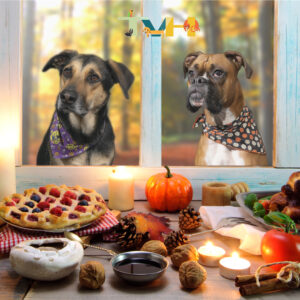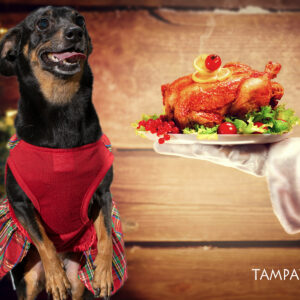Holidays and your pets
Whether you’re hosting the family, or visiting with family or friends this holiday season, we hope that this information will keep your pets safe, happy and healthy. There are lots of potential threats to your pets during this joyous (and stressful) time- so read on to make sure you and your pets make it through the holiday season safe and stress free! Hopefully these tips will let you stay focused on holiday cheer, and not scheduling a trip to the veterinarian’s office.

The Dinner Table
As you probably know, there’s a wide variety of foods that can be disastrous if your pet gets into them. Many of these foods are common ingredients around the holidays. Care should be used during prep, cooking, cleaning and dining to make sure your pet does not eat what they shouldn’t. If you’re hosting a holiday meal, it’s important to remind your guests that your pet should not be given any food from the dinner table. Children are notorious for trying to curry favor with pets, and love to get their attention and affection with food. Be friendly, but firm when laying out the ground rules. While we don’t recommend feeding your pet any food from the table- the following foods are what could land your pet in the vet’s office.
- Fatty foods such as butter, bacon, fatty meat drippings, gravies and meat scraps may seem harmless but can pose very real threats of pancreatitis. Pancreatitis is an inflammation of the pancreas that can result in clinical signs of vomiting, diarrhea, loss of appetite and abdominal pain. Some breeds, such as miniature Schnauzers are very prone to developing pancreatitis but all dogs ingesting a large enough quantity of these foods are at risk. Symptoms may not be immediate and can occur up to 4 days after exposure.
- Discarded food items such as corn cobs, discarded turkey trussing’s, and bones can result in an obstructive risk or gastrointestinal injury that have the potential of requiring surgical removal or repair.
- Turkey Brine: Who would have thought that the recently popular trend of brining your turkey prior to Thanksgiving would be a risk to your pets?! When you remove the turkey, this salt-saturated solution can be very attractive to dogs and cats, who will readily lap it up resulting in salt toxicosis. Clinical signs are excessive thirst and urination, vomiting and diarrhea. This can potentially result in serious electrolyte changes and brain swelling.
- Xylitol: Candies, desserts or other foods that are sweetened with an artificial sweetener called xylitol are dangerous to pets. Xylitol can result in a rapid drop in blood sugar in dogs along with liver damage. Xylitol is also marketed or labeled as ‘Birch Sugar’ and shows up in lots of ‘sugar-free’ products. We’ve covered Xylitol in another blog. Believe it or not, Xylitol is worse for your pet than chocolate.
- Raisins, currants and grapes found in some of our favorite Thanksgiving foods are a very serious concern for dogs as they have the risk of resulting in acute renal failure with even small ingestions.
- Onions & Garlic are also to be avoided for both dogs and cats. Onions contain an ingredient called thiosulphate which is toxic to cats and dogs. The ingestion of onions causes a condition called hemolytic anemia, which is characterized by damage to the red blood cells. Onion toxicity can cause the red blood cells circulating through your pet’s body to burst.
- Chocolates in our desserts or treats are dangerous to our pets. Remember that the darker the chocolate, the more serious the ingestion, and the less they will need to ingest to develop clinical signs of vomiting, diarrhea, agitation, tremors, increased heart rate along with potential seizures.
- Nuts are high in fat and have the risk of pancreatitis. Macadamia nuts are more serious and can ingestions can result in vomiting, diarrhea, inability to rise or walk normally (they take on a drunken appearance and can even drag their rear limbs as if injured)
- Tabletop Holiday decorations are a concern for many reasons. The bouquet of lilies you received from your guests can result in acute renal failure in your cat. Bittersweet flowers are many times included in fall floral arrangements and can cause gastrointestinal upset. Candles can result in burns and flameless candles contain batteries, that when ingested can result in gastrointestinal burns and corrosive injury.
One item which is not mentioned by the Pet Poison Hotline is alcohol. It goes without saying that you should never give your pet alcohol, or leave cups or glasses with alcohol unattended around curious pets.
For those of you with larger breeds, be vigilant about where food is kept unattended on counters or tables. If you’ve ever seen “A Christmas Story” you’ll remember the scene where the family dog devours the entire Christmas turkey, forcing the family to have Christmas dinner at a Chinese restaurant. I’m pretty sure you don’t that to happen.
When you’re finished with your meal and all of the table scraps are going into the trash- make sure that your trash can is secured. Even the most obedient pets are tempted by the wastebasket, which can end up in disaster if your pet gets into it.
The Front Door
The steady stream of family and friends entering your home causes a lot of excitement for your furry friends. If your pet is excited to greet everyone each time the doorbell rings, make sure they are restrained with a leash so they don’t go running out the door. Alternatively, keep them secured in another room or in a crate until all of your guests have arrived. You don’t want to be chasing your pet around the neighborhood when you should be enjoying time with family and friends. It’s a good idea to lay out the ground rules to all of your guests about
 If your pet has a microchip, now is a good time to double check that the microchip company has all of your current information on file. You would be surprised at the number of wayward pets that are brought to Tampa Vet who have a microchip, but we cannot locate the owners due to outdated microchip information. If your pet does not have a microchip, we suggest getting one. For more information on microchipping your pets, check out my earlier blog on this topic.
If your pet has a microchip, now is a good time to double check that the microchip company has all of your current information on file. You would be surprised at the number of wayward pets that are brought to Tampa Vet who have a microchip, but we cannot locate the owners due to outdated microchip information. If your pet does not have a microchip, we suggest getting one. For more information on microchipping your pets, check out my earlier blog on this topic.
Traveling with your pet?
If you’re planning on heading out of town with your pet, make sure your pet is prepared. I’ve offered up lots of travel tips in a previous blog which can be found here.
Have any other concerns about your pet as we head full-steam ahead into the holiday season? Give us a call and we’ll do our best to answer them. We want you and your pets to have a happy and safe holiday season!
